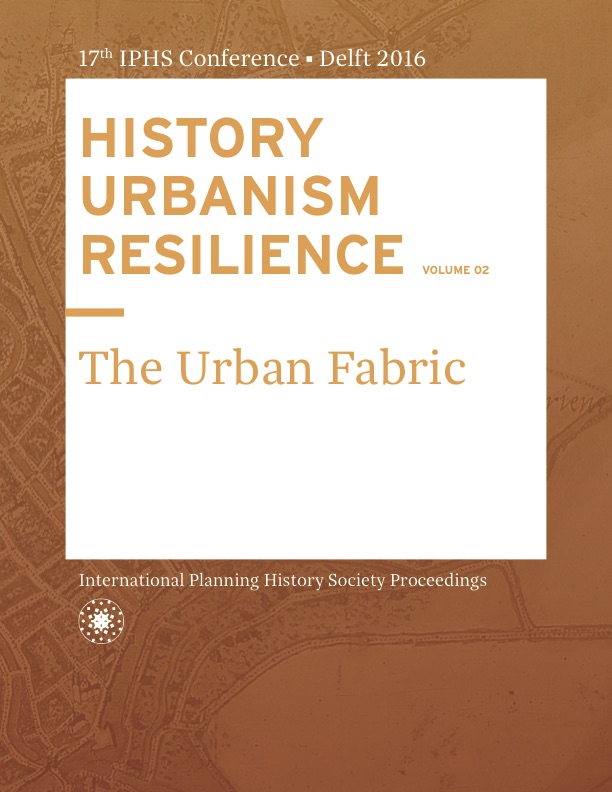A history of visions and plans for the transformation of a coastal tourism city into a knowledge city: Australia’s Gold Coast
DOI:
https://doi.org/10.7480/iphs.2016.2.1242Abstract
Many coastal mass tourism centres have attempted to reinvent themselves as they have grown from informal coastal towns into large cities. Lifestyle migration boosts urban growth as these cities become home to ‘permanent tourists’ attracted by the characteristics that attract tourism. Australia’s best known resort, the Queensland Gold Coast, provides a case study of a resort region experiencing similar transformations to those noted in Honolulu, Miami and Sitges, Spain. These cities have pursued broader socioeconomic resilience rather than the common strategy of simply expanding or improving their tourism appeal. Using literature review and documentary research, this paper traces how ideas of a ‘knowledge city’ have featured in Gold Coast planning history since the 1980s, through proposals including an ‘innovation corridor’, ‘research triangle’, a designated knowledge precinct and the development of universities and hospitals under plans and strategies for economic development. Although implementation has been sporadic, the case study demonstrates a continuity in narrative that has shaped outcomes towards the desired ‘knowledge city’, thereby creating a more cohesive urban structure integrating knowledge nodes, town centres and urban transport infrastructure investments. This case study will add knowledge to inform planners grappling with the transformation of similar coastal tourism areas into significant cities.References
Agarwal, S and G Shaw (eds) 2007 Managing Coastal Tourism Resorts: a global perspective. Cleveden, UK and Buffalo, USA: Channel View Publications.
Bosman, C, A Dedekorkut-Howes and A Leach (eds) 2016 Off the Plan: the urbanisation of the Gold Coast. Clayton: CSIRO Publishing.
Bramwell, B (ed.) 2004 Coastal Mass Tourism: diversification and sustainable development in southern Europe. Bristol: Channel View Publications.
Burchill, G 2005 Passion, Power and Prejudice: a remarkable untold story of a magic city in the making. Gold Coast and Brisbane: Golden 12, Boolarong Press.
Butler, RW 2011 Tourism Area Life Cycle, Contemporary Tourism Reviews, Oxford: Goodfellow. Accessed 20 March 2016 at http://www.goodfellowpublishers.com/free_files/fileTALC.pdf
Campillo-Besses, X, G Priestley and F Romagose, 2004, Using EMAS and Local Agenda 21 as tools towards sustainability: the case of a coastal Catalan resort, Ch.11 in Bramwell (ed.) 2004, 220-248.
City of Gold Coast, 2013, Gold Coast economic development strategy 2013-2023. Accessed 5 April 2016 at http://www.goldcoast.qld.gov.au/economic-development-strategy-8576.html
Couchman, P, I McLoughlin & D Charles (2008) Lost in translation? Building science and innovation city strategies in Australia and the UK, Innovation, 10(2-3), 211-223.
Cracknell, J., 1994, Vision in Conflict: the founding of Australia’s first private university, Bond University. Camarillo, CA: Innova.
Economou D and M Vrassida 2005 Urban dynamics and networking in coastal cities: the case of tourism, in Land use and Water Management in a Sustainable Network Society: proceedings of the 45th Congress of the European Regional Science Association, Amsterdam.
Ivars i Baidal, J, I Rodriquez Sanchez and J Vera Rebollo 2013 The evolution of mass tourism destinations: new approaches beyond deterministic models in Benidorm (Spain), Tourism Management 34(2013):184-195
Jones, A and M Phillips (eds) 2010 Disappearing Destinations: Climate Change and the Future Challenges for Coastal Tourism. Wallingford: CABI Publishing.
Mort, GS and A Roan 2003 Smart State: Queensland in the Knowledge Economy. Queensland Review, Vol. 10, No. 1, May 2003: 11-28. ISSN: 1321-8166. Accessed 5 April 2016 at http://search.informit.com.au.ezproxy.bond.edu.au/documentSummary;dn=800496171161168;res=IELLCC>
O’Hare D, B Bajracharya and I Khanjanasthiti 2012 Transforming the tourist city into a knowledge and healthy city: reinventing Australia’s Gold Coast, refereed proceedings, IFKAD-KCWS conference, Matera, Italy.
Queensland Innovation Council 2001 Development of technology incubators, parks and precincts: a review and start-up guide for proponents. Brisbane: Queensland Government.
Romero-Padilla, Y, E Navarro-Jurado and E Malvarez-Garcia 2016. The potential of international coastal mass tourism destinations to generate creative capital, Journal of Sustainable Tourism 24(4):574-593.
Rowe, P., 1991, Making a Middle Landscape. Cambridge, Mass.: MIT Press.
Sassen, S and A Portes 1993 Miami: A New Global City? Contemporary Sociology 22(4): 471-477.
Saunders, K 2014, Bond University: the first 25 years. Gold Coast: Bond University Publishing.
Stimson, R and J Minnery 1998 Why people move to the ‘sun-belt’: a study of long-distance migration to the Gold Coast, Australia, Urban Studies 35(2): 193-214.
Yigitcanlar, T 2011 Knowledge-based urban development redefined: from theory to practice knowledge-based development of cities. In Yigitcanlar, T & C Fachinelli (Eds) Proceedings of the 4th Knowledge Cities World Summit, The World Capital Institute and Ibero-American Community for Knowledge Systems, Bento Goncalves, Brazil, 389 -399.

